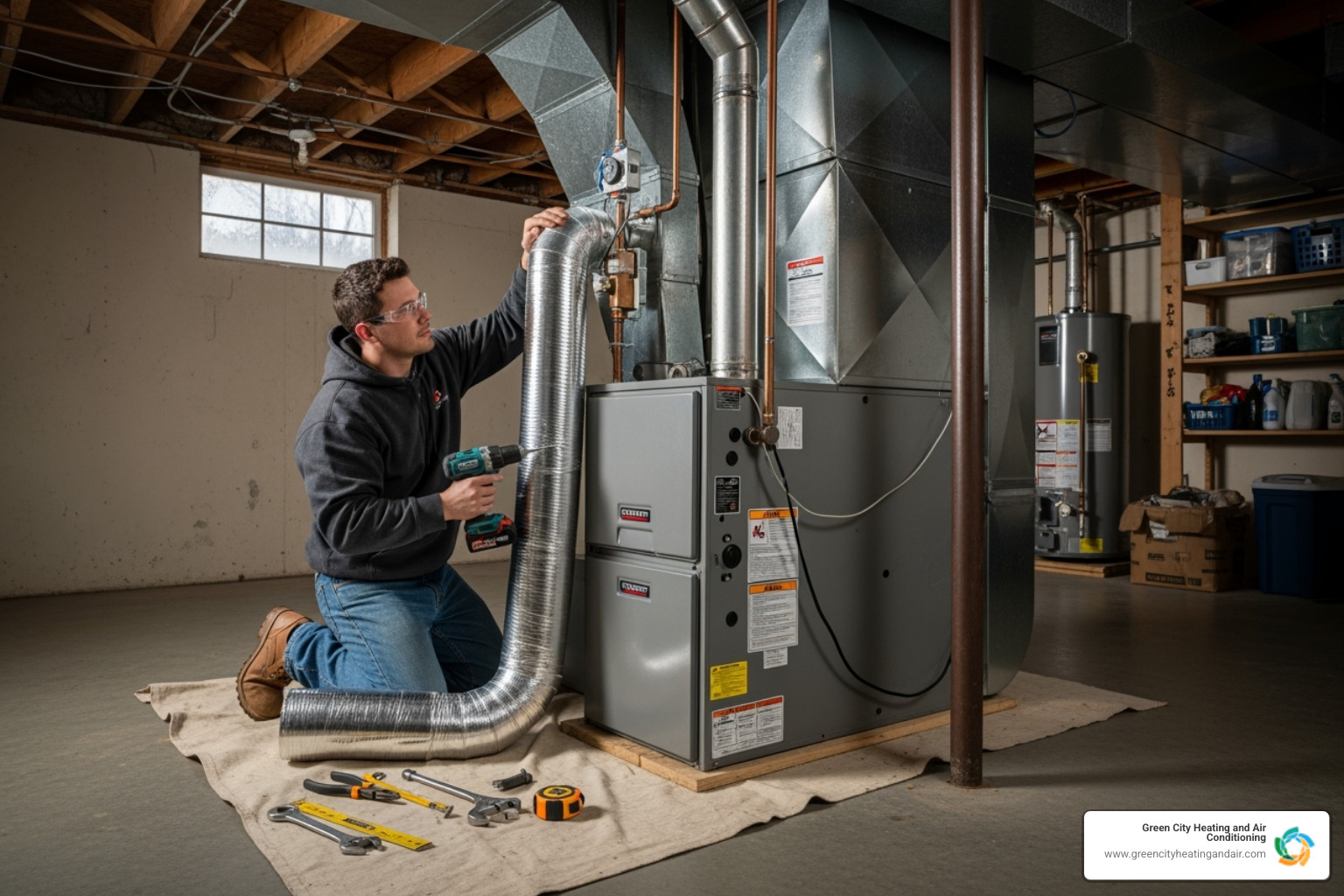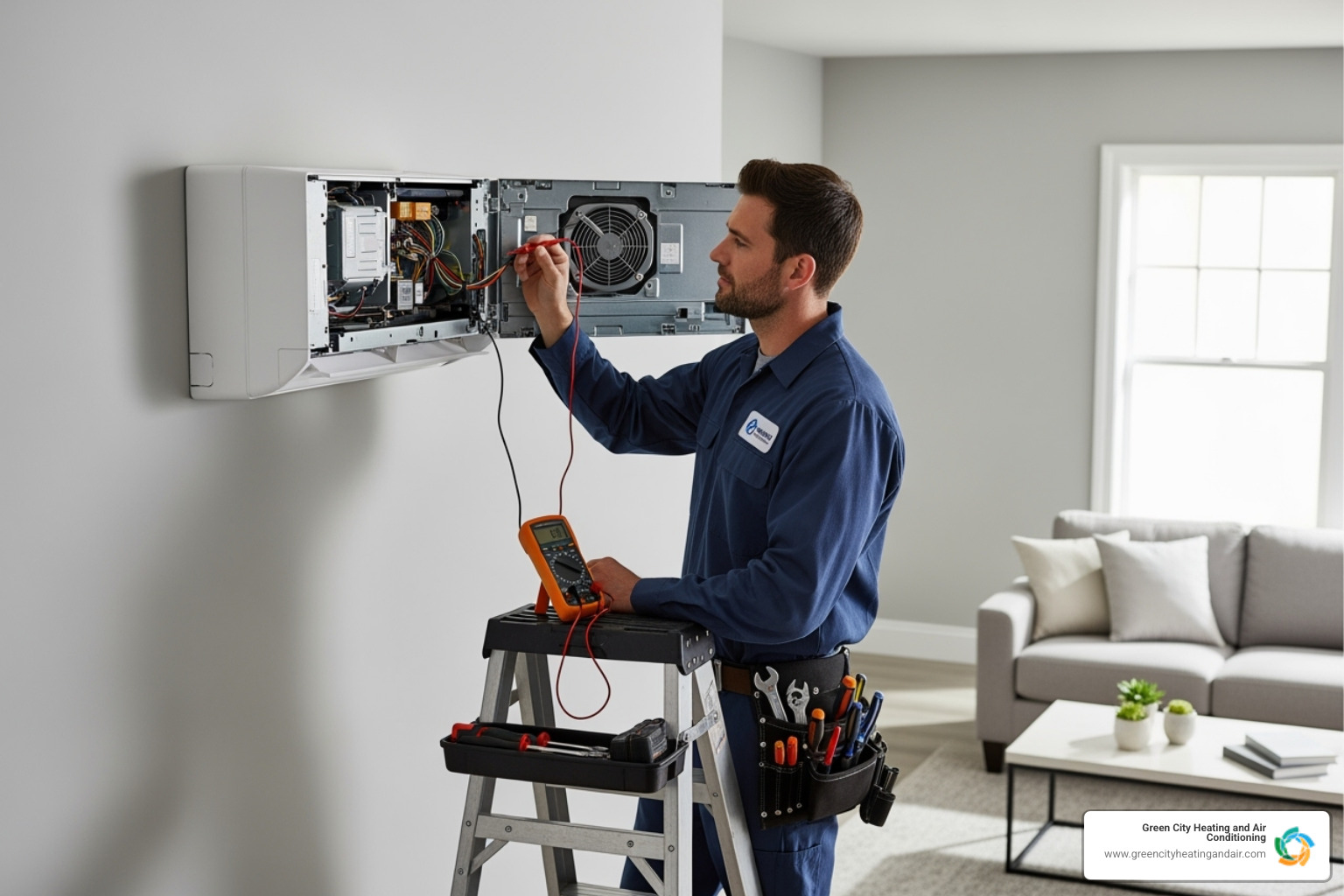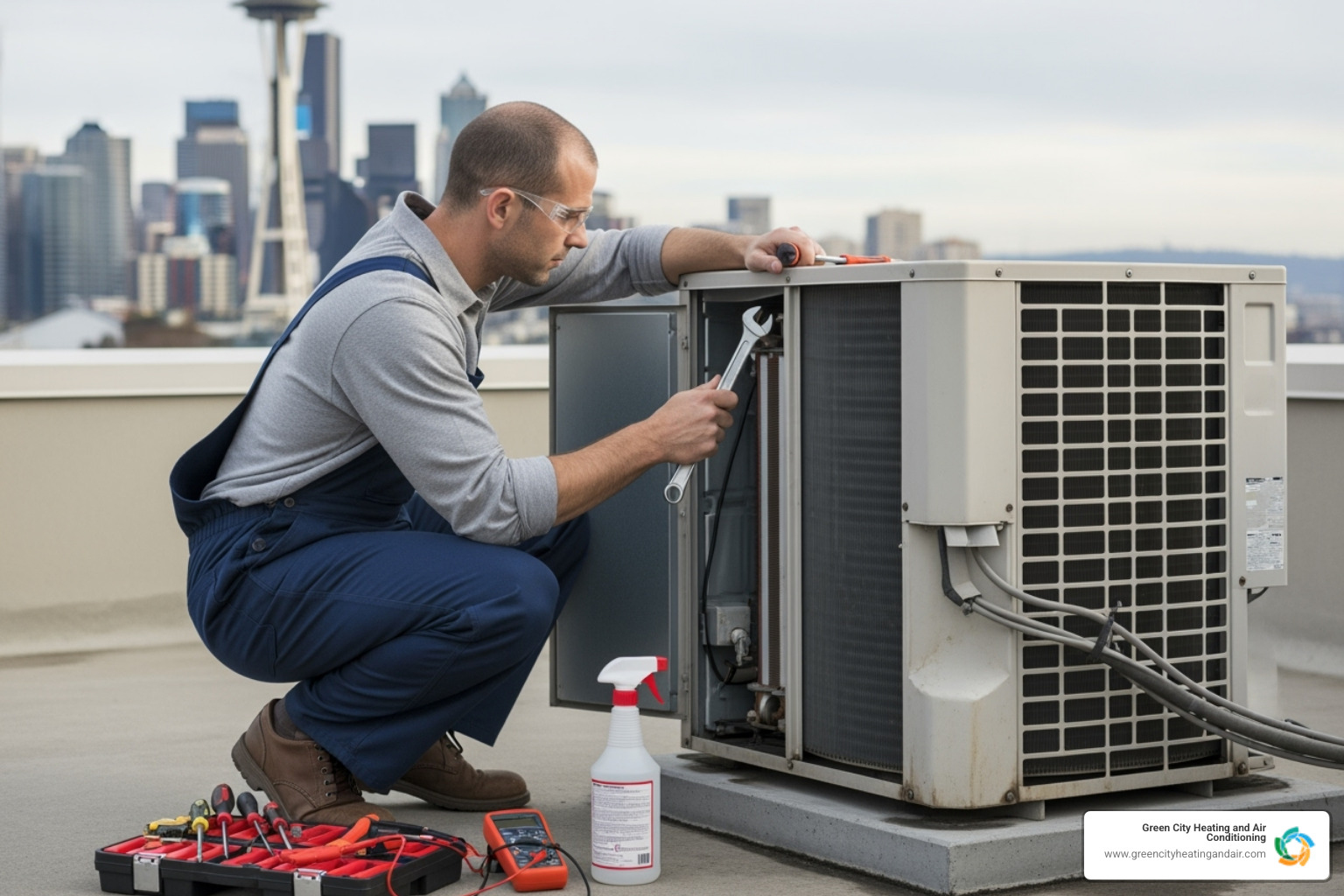If your AC split mini system in Clyde Hill isn’t cooling the way it used to, the problem might be hiding in the circuit board. This small but essential component keeps everything running smoothly. When it fails, it can interrupt your entire system. During the summer, that’s the last thing anyone wants, especially when the heat hits its peak. Many homeowners are caught off guard by how quickly a small issue in the circuit board can lead to larger problems throughout the system.
Understanding how circuit board failures happen, what causes them, and what early signs to watch for can help you respond before the problem gets worse. Whether the unit stops responding to controls or begins to shut off randomly, these are not issues to ignore. Clyde Hill homeowners often depend on these compact units for room-by-room cooling, so keeping each component working right is key to staying comfortable during hotter months.
Understanding Common Circuit Board Failures in AC Split Mini Systems
An AC split mini system works quietly in the background to cool targeted spaces in your home. It’s made up of two main parts, an indoor air-handling unit and an outdoor compressor. Inside the system, the circuit board acts as the brain. It processes signals from the thermostat and sensors, then communicates with all the electrical parts to make sure they’re working together. If the circuit board fails, your whole cooling system could stop working properly.
Some issues are easy to miss at first. The unit may start acting a little strange but still cool the air. Over time, the signals between the thermostat and the system grow weaker or disappear entirely. You may notice that the indoor unit won’t power on, the display is blank, or the airflow is inconsistent. All of these can trace back to a problematic circuit board.
This component is especially sensitive. It has to manage all the electric input coming into the system and needs to remain protected from physical or environmental damage. That’s why failures tend to show up in ways that seem sudden, even though damage has likely been building up over time. Even subtle problems on the board can keep your Clyde Hill home from cooling as it should.
Primary Causes of Circuit Board Failures
Circuit board issues can start in a few different ways. Some are related to the surrounding environment, while others result from wear and tear over the lifespan of the unit. Often, homeowners aren’t aware anything is wrong until the issue becomes too noticeable to ignore. Here are some of the top causes of failures inside the circuit board of AC split mini systems:
- Electrical issues: Power surges or fluctuations can cause shorts or permanently burn components on the board. A sudden spike can damage the circuits and make them unresponsive.
- Overheating components: If the system doesn’t stay cool enough, internal components can overheat. When that heat reaches the board, connections can crack or stop working.
- Moisture and corrosion: Clyde Hill homes near coastlines or shaded areas may experience higher humidity. If moisture gets into the system, it can corrode metal parts on the board.
- Dust and debris: Even small amounts of dust can settle on sensitive board surfaces, interfering with signals and heat dissipation. Over time, this buildup strains the entire system.
One example of this is when a homeowner in Clyde Hill noticed their AC unit shutting off randomly every few hours. A visual inspection didn’t show anything wrong with the unit itself, but further review revealed corrosion on the board due to unnoticed condensation build-up. Preventing these issues often means making sure the unit is kept dry and well-maintained.
Circuit board problems are easy to overlook but can quickly become expensive if not addressed early. Understanding where these failures begin is the first step toward protecting your system and keeping it running strong through the hottest days of the year.
Signs of Circuit Board Problems
Circuit board issues don’t always come with loud warnings. Many times, things start small and get worse if ignored. Paying attention to early signs can help prevent bigger damage to your AC split mini in Clyde Hill.
Here are some indicators that the circuit board might be failing:
- Unresponsive controls: If your unit doesn’t respond to inputs from the remote or wall control, the board could be the problem. Even basic commands like turning the unit on or off can stop working.
- Irregular temperature readings: If the system isn’t maintaining the set temperature, it might be getting incorrect signals. Faulty connections on the circuit board often cause inconsistent readings and uneven cooling.
- Frequent system shutoffs: If your AC turns off suddenly without completing a cooling cycle or restarts often, the board may be failing to maintain proper timing and instruction to other components.
- Error codes displayed: Many AC split mini units include a diagnostic feature that lights up error codes. These codes often point to communication problems linked directly to circuit board failure.
An example from right in Clyde Hill involved a homeowner whose unit flashed a code, but since it still ran, they ignored it for a while. Eventually, the entire system shut down during a weekend heat wave. It turned out to be a solder crack on the board. That small fault expanded due to temperature swings, leading to total failure.
Even one of these symptoms can signal a deeper issue, and waiting puts your comfort at risk. If you notice repeated errors, partial functionality, or performance that comes and goes, it’s time to take it seriously.
Preventing Circuit Board Failures in Your Clyde Hill Home
Avoiding circuit board failure starts with taking care of your AC split mini all year. Routine upkeep plays a major role. Homeowners who skip regular checkups are more likely to deal with sudden breakdowns, especially during peak summer use.
Here are a few ways to help protect this key part of your system:
1. Schedule regular maintenance. Annual inspections give professionals a chance to clean, test, and identify weak points before they fail.
2. Keep the unit clean. Clear any dust or debris around the indoor and outdoor units. A clogged system holds heat and spreads dirt inside where it doesn’t belong.
3. Protect the system from moisture. If your unit is installed in an area with high humidity or occasional leaks, ask our technicians about moisture barriers and other protective steps.
4. Address electrical concerns. If your home has unstable voltage or older wiring, make sure it’s addressed to prevent damaging surges.
5. Replace air filters on time. Dirty or clogged filters reduce airflow, overheating the system and adding stress on internal parts such as the board.
Even with perfect installation, wear and environmental stress can lead to problems over time. But maintenance reduces risk and often extends the life of both the board and the AC system itself. It’s less about doing any one thing once, and more about keeping good habits all season.
When to Call Our Technicians for Help
There comes a point when home checks and basic care aren’t enough. When your AC split mini in Clyde Hill starts acting up in familiar but not fixable ways, that’s the time to bring in our professionals. Trying to reset the unit or wait out the problem rarely works. Circuit board issues don’t fix themselves.
A few signs you shouldn’t ignore:
- The unit trips the breaker repeatedly
- Blinking lights or error codes persist even after resets
- The indoor unit powers on but doesn’t communicate with the outdoor unit
- There’s no cool air even though everything seems to be running
Even if it's only happening now and then, that’s your cue. Our technicians use diagnostic tools to isolate the exact source of the issue. They can tell whether you’re dealing with a full board failure, a loose connection, or small corrosion that’s spreading. Fast diagnosis allows for proper repair or replacement before summer temperatures rise even higher.
Getting help early means preserving the rest of your system. A damaged board can affect fans, compressors, and sensors connected to it. Fixing the board might stop the spread of damage to these more expensive parts.
Ensuring Long-Term Reliability of Your Clyde Hill AC Split Mini System
To stay efficient and dependable, your AC split mini system in Clyde Hill needs ongoing attention. Circuit board failures are one of the more complicated issues but avoiding them isn’t impossible. Staying alert to warning signs, maintaining clean units, and not delaying service calls all help reduce system breakdowns.
If your system is already a few years old, regular checks are even more important. That’s the time when wear starts to show, especially on boards with old wiring or exposure to moisture. Peace of mind during summer comes from choosing to stay ahead of failures instead of reacting to them.
The best way to protect your comfort is to make inspections part of your seasonal routine in Clyde Hill. When you do, your AC split mini will run more smoothly, last longer, and cool your home exactly when you need it. Keeping the circuit board in good shape is just one step, but it makes a huge difference across the whole system.
Enhance the performance and comfort of your home by scheduling professional maintenance for your AC split mini in Clyde Hill with Green City Heating and Air Conditioning. If you're experiencing recurring issues or want reliable advice on upkeep, our experienced team is here to help keep your system operating efficiently. For a quick estimate or to book a service visit, please contact us today.
More Blogs
Latest
insights and tips

Warmth Unleashed: The Ultimate Seattle Furnace Installation Handbook

Emergency Ductless AC Repair in Bellevue: Get Your Cool Back Fast










